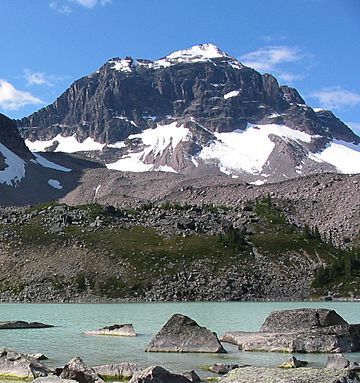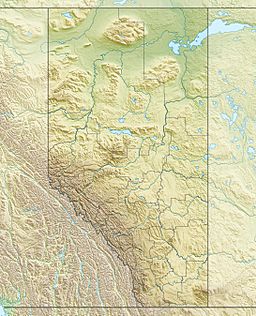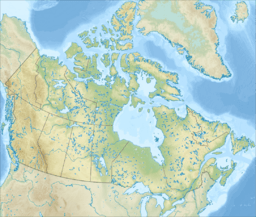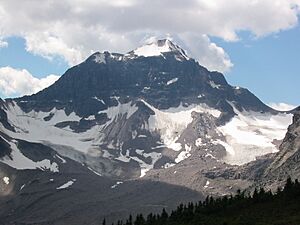Karpathos Peak (Mount Olympus) facts for kids
Quick facts for kids Karpathos Peak |
|
|---|---|

Karpathos Peak seen from Fryatt Valley
|
|
| Highest point | |
| Elevation | 2,987 m (9,800 ft) |
| Prominence | 367 m (1,204 ft) |
| Parent peak | Mount Belanger (3120 m) |
| Listing | Mountains of Alberta |
| Geography | |
| Location | Alberta, Canada |
| Parent range | Canadian Rockies |
| Topo map | NTS 83C/05 |
| Type of rock | Sedimentary |
| Climbing | |
| First ascent | 1926 by J.W.A. Hickson, Howard Palmer, Hans Fuhrer |
| Easiest route | Mountaineering |
Karpathos Peak is a tall mountain in Jasper National Park, Alberta, Canada. It stands 2,987 metres (9,800 ft) high in the beautiful Canadian Rockies. This mountain was once called Mount Olympus.
It is found in the Athabasca River valley. Karpathos Peak is at the top of the Fryatt Creek Valley. It shares a high ridge with other peaks like Mount Christie and Brussels Peak. You can sometimes see Karpathos Peak from the Icefields Parkway if the weather is clear.
Mountain History and Naming
This mountain is named after Karpathos, a Greek island. On that island, there is a town called Olympos. The peak was first unofficially called Mount Olympus.
However, its name was changed to Karpathos Peak. This was done to avoid confusion with other mountains named Mount Olympus in the same mountain range. The name Karpathos Peak is still waiting to be officially adopted.
The first time people successfully climbed this mountain was in 1926. The climbers were J.W.A. Hickson and Howard Palmer. They were guided by Hans Fuhrer.
Understanding Karpathos Peak's Geology
Karpathos Peak is made of sedimentary rock. This type of rock forms from layers of sand, mud, and tiny bits of plants and animals. These layers built up over millions of years, from the Precambrian to the Jurassic periods.
Later, powerful forces pushed these rocks eastward. This movement happened during an event called the Laramide orogeny. This process caused the rocks to fold and lift, forming the mountains we see today.
Climate and Weather Around the Peak
Karpathos Peak is in a subarctic climate zone. This means it has very long, cold, and snowy winters. The summers are short and mild.
Temperatures can drop very low, sometimes below -20°C (which is -4°F). With the wind, it can feel even colder, below -30°C (-22°F). The snow and ice that melt from Karpathos Peak flow into Fryatt Creek and Lick Creek. These creeks then join the Athabasca River.




